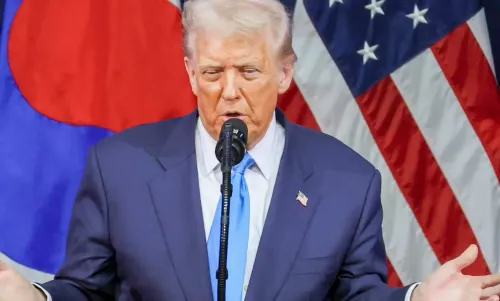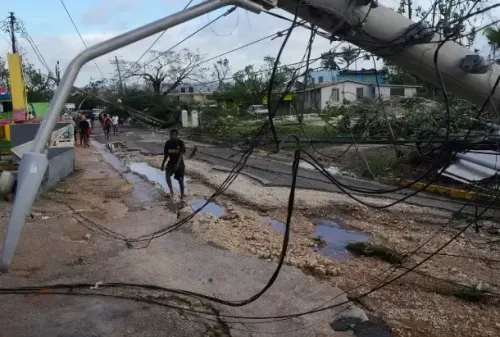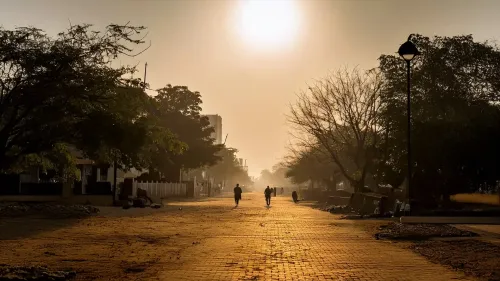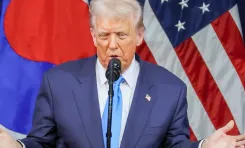Are Muhammad Yunus's Designs Set to Dismantle Bangladesh?
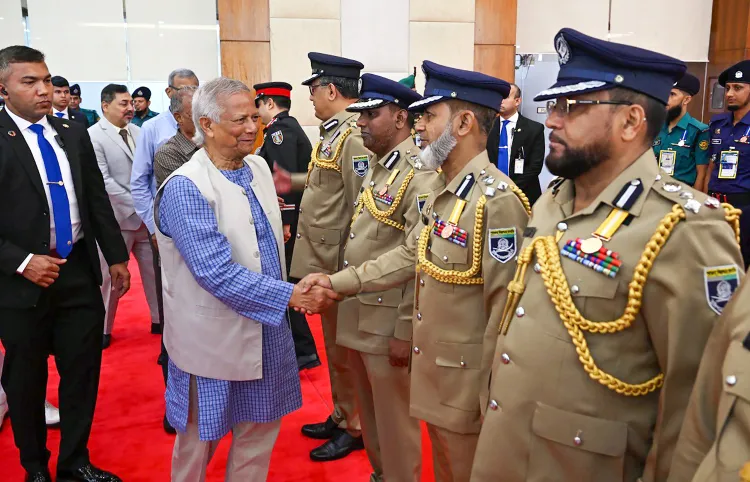
Synopsis
Key Takeaways
- Muhammad Yunus has banned the Awami League under the Anti-Terrorism Act.
- The ban allows for immediate arrests of Awami League leaders.
- Radical Islamic leaders are gaining visibility amid the ban.
- Questions arise about the legality of banning a party's activities while it remains registered.
- The political landscape in Bangladesh is shifting dramatically.
New Delhi: The interim government of Bangladesh, led by Muhammad Yunus, has announced a gazette notification prohibiting all operations of the former Prime Minister Sheikh Hasina's party, the Awami League, along with its affiliated organizations. This ban has been implemented under the Anti-Terrorism Act until the completion of the trial against the party and its leaders in the Bangladesh International Crimes Tribunal (ICT).
The prohibition encompasses all activities, including any forms of publication, media campaigns, online and social media interactions, processions, meetings, gatherings, and conferences.
Reports indicate that Yunus is targeting the Awami League (AL) to gain favor with Pakistan while leveraging India's 'Operation Sindoor' to incite anti-India sentiments domestically. Essentially, Yunus is distancing Bangladesh from India.
During sit-in protests organized by Hasnat Abdullah of the National Citizen Party (NCP) to pressure the interim administration to ban the Awami League (AL), two radical Islamic leaders were present: Mufti Jashimuddin Rahmani of the Ansarullah Bangla Team (also known as Ansar-al Islam Bangladesh or Ansar Bangla - ABT) and Mufti Harun Izhar, the Bangladesh module chief of LeT.
Jasim Uddin Rahmani, the leader of the globally banned ABT and a long-time ally of Al-Qaeda, was seen leading an anti-Awami League rally in Dhaka's Shahbagh on May 11. His return, after years of incarceration for inciting murder, has triggered national outrage and international concern. Meanwhile, other radical groups like Hizb ut-Tahrir (HuT) are openly advocating for the establishment of a caliphate and calling for actions against India. Yet, the Yunus regime has not issued any condemnation.
Rather, the regime has focused its efforts on the country's largest secular force. By employing the Anti-Terrorism Act, it has placed a ban on the Awami League while allowing globally recognized terrorists to gain prominence.
With the ban on the Awami League's activities now in effect, legal barriers to arresting party leaders and activists have been lifted. The delay in announcing the ban had previously complicated officials' efforts to execute arrests. Now, the police can promptly detain Awami League leaders and activists participating in rallies, processions, or clandestine meetings.
Following the imposition of the Anti-Terrorism Act ban, numerous questions have surfaced. Can the law effectively ban activities without disbanding the party itself? What implications does this have for the Awami League's registration as a political entity? If the law is amended to facilitate the trial of the Awami League for crimes against humanity, what stance will the interim government take regarding the alleged crimes of JeI during 1971?
After successfully prohibiting and deregistering the Awami League through the Bangladesh Election Commission, the party, which has governed Dhaka for over two decades, is now officially disqualified and barred from participating in any upcoming elections until the ban is revoked and its registration restored by the Election Commission.
Yunus’s next target seems to be the removal of President Shahabuddin, potentially elevating himself or appointing someone from the hard-line Islamist faction. This would ensure that even if the Bangladesh Nationalist Party (BNP) ascends to power, they will have a President compliant with Yunus and his circle. Opposition from Army Chief General Waker-uz-Zaman remains, but whether he will succeed is uncertain. Bangladesh stands at a crossroads, attempting a democratic turnaround.
In the meantime, it has been confirmed that the Yunus-led interim administration is planning to announce the 'July Declaration' by June 10, which could lead to the closure and demise of the Constitution of Bangladesh. Following this, the President will be required to resign. The inauguration of a new President under the 'July Declaration' is likely to result in the dismissal of the Chief of Army Staff, who might also face trial. Sources have confirmed that General Waker-uz-Zaman and his associates convened secretly in Bangabhavan on Monday to brief the President about the interim administration's announcements.
There are strong rumors that the Army Chief aims to oust Yunus. Such a move could lead to severe repercussions for Zaman, possibly branding him a traitor. In addition, in a surprising turn of events, General Zaman was instructed by Yunus not to proceed with a planned five-day visit to the United States, originally scheduled to commence on May 11 for the Land Forces Pacific (LANPAC) Symposium and Exposition-25 in Honolulu.
Alarmingly, the interim government's Legal Advisor, Asif Nazrul, held a meeting with Harun Izhar. This meeting reportedly took place on April 23 within the Ministry of Law in Dhaka.
Sources from Bangladesh's military intelligence indicate that Nazrul met with Izhar, a notorious jihadist known for orchestrating terror attacks from Bangladeshi soil.
Worryingly, this meeting occurred less than 24 hours after the massacre of 26 Indian tourists in Pahalgam by terrorist organizations based in Pakistan and supported by the Pakistani military.
To exacerbate the situation, Nazrul made a verified Facebook post shortly before the meeting, containing unfounded claims widely condemned as provocative and insensitive to the victims' families.
His statements, filled with speculation and politically charged rhetoric, drew strong criticism for being not only baseless but also insensitive to those grieving.
A senior officer from Bangladesh's Army intelligence confirmed that the meeting was recorded, but the contents remain classified. 'The presence of a wanted terrorist inside a government ministry is a grave concern,' the officer remarked. 'It indicates a potentially dangerous alliance between radicals and figures within the interim administration.'
Izhar, along with several known LeT operatives, has been a significant presence in regional jihadist operations. His involvement in a foiled 2009 plot to bomb the Indian High Commission in Dhaka has left a dark mark on Bangladesh's counter-terrorism efforts.
Izhar is no stranger to law enforcement. With connections to Hefazat-e-Islam (HeI), a radical Islamist group, he has played a pivotal role in radicalizing individuals under the guise of organizations like Manhaz. On March 30, 2024, a video surfaced showing him leading students in a pledge of allegiance to Hefazat's cause, calling for jihad against India and Myanmar.
He has also led operations under various pseudonyms—Towhidi Janata, Anti-Satime Rasul Andolon, and Kara Mukti Andolon—allegedly aimed at facilitating jailbreaks for convicted extremists following the ousting of former Prime Minister Sheikh Hasina. His activities escalated during Prime Minister Modi's visit to Bangladesh in 2021, coinciding with the nation's 50th independence anniversary, where he orchestrated mass protests against PM Modi's presence.
Meanwhile, Indian security forces and agencies have been advised to remain vigilant along the India-Bangladesh border due to the heightened presence of Pakistan's ISI and military officials in Bangladesh. The Yunus-led interim government appears to be directly supporting jihadi, extremist, and terrorist organizations. These Islamic radical elements have infiltrated critical sectors of governance, the judiciary, and law enforcement, presenting a severe security threat to the region and the world.
(The writer is an expert on South Asia and Eurasia, previously associated with the Manohar Parrikar Institute for Defence Studies and Analyses. The views expressed herein are personal.)

